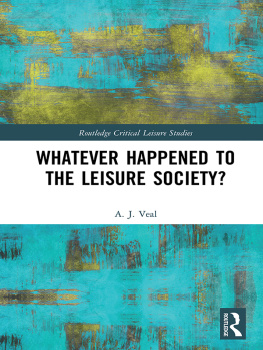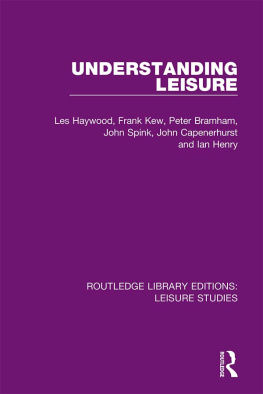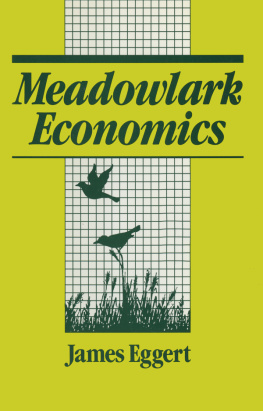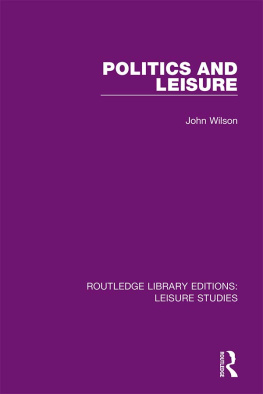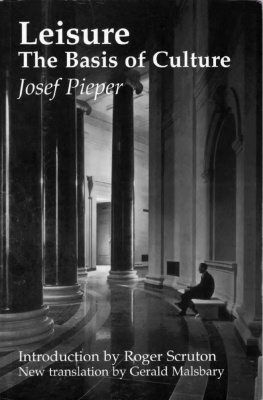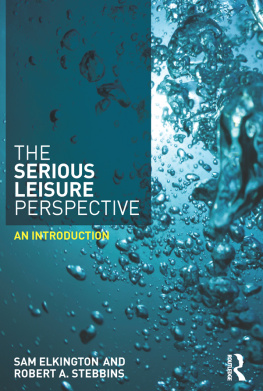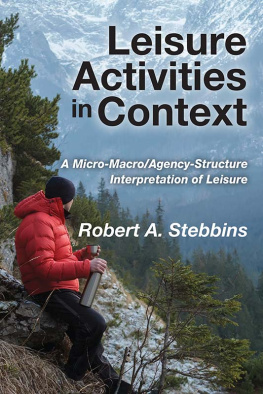ROUTLEDGE LIBRARY EDITIONS:
LEISURE STUDIES
Volume 11
LEISURE AND THE FUTURE
A. J. (Tony) Veal is Adjunct Professor in the Business School, University of Technology, Sydney. He is past president of the UK Leisure Studies Association and of the Australian and New Zealand Association for Leisure Studies. His latest book, Whatever Happened to the Leisure Society? was published by Routledge in 2018.
LEISURE AND THE FUTURE
A. J. VEAL
First published in 1987 by Allen & Unwin (Publishers) Ltd
This edition first published in 2019
by Routledge
2 Park Square, Milton Park, Abingdon, Oxon OX14 4RN
and by Routledge
52 Vanderbilt Avenue, New York, NY 10017
Routledge is an imprint of the Taylor & Francis Group, an informa business
1987 A. J. Veal
All rights reserved. No part of this book may be reprinted or reproduced or utilised in any form or by any electronic, mechanical, or other means, now known or hereafter invented, including photocopying and recording, or in any information storage or retrieval system, without permission in writing from the publishers.
Trademark notice: Product or corporate names may be trademarks or registered trademarks, and are used only for identification and explanation without intent to infringe.
British Library Cataloguing in Publication Data
A catalogue record for this book is available from the British Library
ISBN: 978-0-367-11036-9 (Set)
ISBN: 978-0-429-24268-7 (Set) (ebk)
ISBN: 978-0-367-13737-3 (Volume 11) (hbk)
ISBN: 978-0-429-02837-3 (Volume 11) (ebk)
Publishers Note
The publisher has gone to great lengths to ensure the quality of this reprint but points out that some imperfections in the original copies may be apparent.
Disclaimer
The publisher has made every effort to trace copyright holders and would welcome correspondence from those they have been unable to trace.
Leisure and the Future
A. J. Veal
A. J. Veal, 1987
This book is copyright under the Berne Convention.
No reproduction without permission. All rights reserved.
Allen & Unwin (Publishers) Ltd,
40 Museum Street, London, WC1A 1LU, UK
Allen & Unwin (Publishers) Ltd,
Park Lane, Hemel Hempstead, Herts, HP2 4TE, UK
Allen & Unwin, Inc.,
8 Winchester Place, Winchester, Mass. 01890, USA
Allen & Unwin (Australia) Ltd,
8 Napier Street, North Sydney, NSW 2060, Australia
Allen & Unwin NZ Ltd,
60 Cambridge Terrace, Wellington, NZ
First published in 1987
British Library Cataloguing in Publication Data
Veal, A. J.
Leisure and the future.
(Leisure and recreation studies; 4)
1. Leisure Social aspects Great Britain
I. Title II. Series
306.480941GV75
ISBN 0-04-790006-7
ISBN 0-04-790007-5 Pbk
Library of Congress Cataloging-in-Publication Data
Veal, Anthony James.
Leisure and the future.
(Leisure and recreation studies; 4)
Bibliography: p.
Includes index.
1. Leisure Great Britain. 2. Social prediction
Great Britain. I. Title. II. Series
GV75.V398 1987 790.0941 8622191
ISBN 0-04-790006-7 (alk. paper)
ISBN 0-04-790007-5 (pbk.)
Set in 10 on 11 point Bembo by Computape (Pickering) Ltd.
and printed in Great Britain by Billings and Sons Ltd.
London and Worcester
The origins of this book lie in a small grant awarded to me in the early 1970s by the then Social Science Research Council (SSRC) to conduct a fairly mechanical number crunching exercise to see if I could produce forecasts of leisure participation for Britain (Veal, 1976, 1979, 1980). Having ventured into leisure forecasting I soon discovered two things; first that there is a great deal more to forecasting than number crunching, and secondly that a concern for and interest in the potential role of leisure in future society is by no means novel. So in addition to conducting the promised quantitative work for the SSRC project I also found myself exploring the history of ideas about the future of leisure. The initial research was started in the context of growth in the UK economy and population, but as the 1970s drew to a close recession and unemployment and the micro-electronics revolution pushed to the fore a very different set of concerns about the future, all of which had to be taken into account in writing a book on leisure and the future. So great has been the task of monitoring and keeping up with the deluge of written material on work, leisure and the future which has appeared in the last five years, that I have often thought that there was a danger of the future arriving before the book was finished.
The aim of the book is not to advocate one particular point of view. I have attempted to review and reflect the state of the art and to illustrate that whenever there is a firmly held, even dogmatic, view about the way the future will develop a contrary view can be found which is believed just as firmly and can be argued just as convincingly. The aim of the book is therefore to be a guide and a source rather than a polemic. If there is a message in the book it is that although we cannot know what the future will be we should at least be actively concerned about it.
I should like to acknowledge the support of the Social Science Research Council for the initial grant which launched my interest in the field of futures research and the Countryside Recreation Research Advisory Group and the Office of Population Censuses and Surveys Social Survey Division who afforded me access to the General Household Survey data. I am grateful to my colleagues, initially at the Centre for Urban and Regional Studies at Birmingham University and later at the Polytechnic of North London, and more widely in the Leisure Studies Association, for providing the intellectual companionship and support which is necessary if one is to survive the potentially lonely activity of research. Finally I would like to thank Stanley Parker and Sarah Gregory who have provided the vital encouragement and gentle harassment necessary to ensure that I completed the book.
AJV
London
February 1986
For the vast majority of the worlds inhabitants leisure has not been a significant phenomenon, let alone a problem, in any age except the present one. Minorities such as members of royal or aristocratic families and the merely wealthy have frequently enjoyed lives of leisure; they have been faced with decisions about what to do with their leisure time. For the mass of the people it might be said that religious observances have provided a form of leisure, designating certain periods, such as the sabbath and saints days, as non-working time and providing spectacle and entertainment and, incidentally, channelling and controlling potentially disruptive leisure-time energies. Anthropological research suggests that some primitive societies, particularly those in favourable climates such as the Pacific, have enjoyed substantial leisure time and there is the historical quirk of certain periods in the history of Rome when its citizens are said to have enjoyed no less than 175 days holiday a year (Mercer, 1980, p. 182). But this has not been the general pattern in Western society. When periods of peace, good harvests and benevolent rulers coincided life may have been less of a struggle, but for most of the people for most of the time their lot has been one of unremitting toil. It is no coincidence that the most numerous group iri any society is referred to as the working class.





